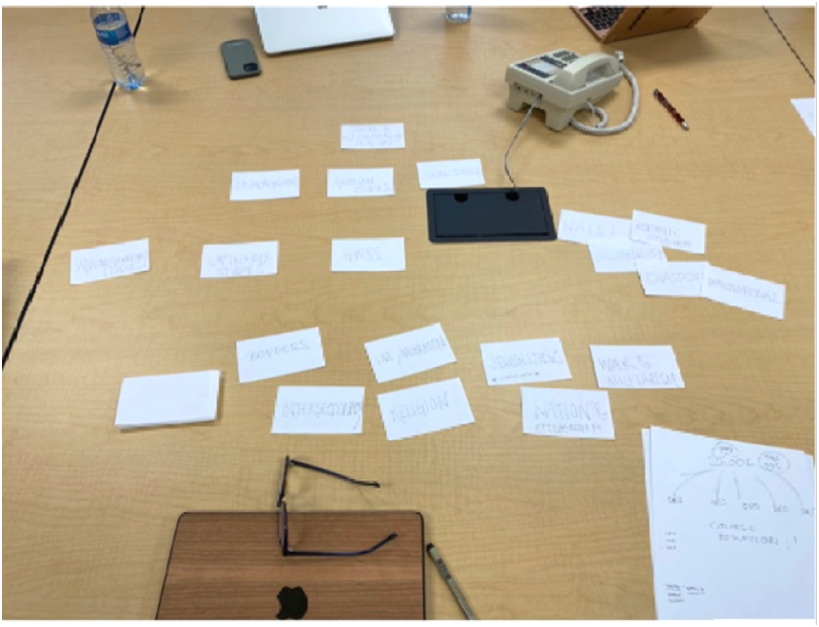Or: Is There Such a Thing as a Values-Based Consolidation??
We were seated at a conference table in a room with no windows. The room was in a mall that the University had purchased in the late aughts, after the anchor stores could no longer pay rent. Each of us represented a department: African American studies; gender, women’s & sexuality studies; Latina/o/e studies; and Native American & Indigenous studies. Our mission was to draft a blueprint for a new school, where we and our colleagues would be housed. As we problem-solved in RES-UCC2520B, it was not lost on us that our task risked becoming a footnote to the 21st-century university’s privatization and mall-ification, complete with black and gold insignias adorning the atrium. Could we build something worth belonging to under these conditions—ones that replayed the settler academy’s raced and gendered exclusions beginning at least two centuries ago?


I originally turned to the HuMetricsHSS Initiative to support a potential merging of my department with one other, amidst a flurry of retirements during the lockdown portion of the pandemic. I had participated in an enormously constructive HuMetrics workshop at a retreat, and this merging seemed the perfect moment to craft ethical and transformative metrics. I was grateful that my chair, Dr. Stephen Warren, supported folding HuMetrics’s values-based practices into our governance, curriculum, and culture, moving forward.
After excitedly learning that HuMetrics would fund our initiative, we suddenly found out that our college had placed our merger on hold. The university’s budget deficit, it turned out, meant far deeper cuts than anyone had anticipated. Our deans, provost, president, and others have valiantly worked to sustain the vitality of our beautiful campus, as our state, like many others, continues to cut funding to its public universities. If the institution could not replace retired faculty, and current numbers were insufficient to run excellent program, we wondered how we could foster vibrant teaching and research.
Consolidation came up as a solution. Let’s be honest: this is not a welcome word in most workplaces. In higher education, it is perhaps especially unwelcome for those working in areas such as ours: departments where people study, teach and learn about long-marginalized subject matter, and which are comprised of many faculty and students academia has underserved. Lots of us are featured on the university website in the context of “diversity,” even as figures on- and off-campus misunderstand, misconstrue, or threaten our work. We had already survived manifold cuts, and trust in leadership was… less than abundant. There was, in short, a thick history surrounding this proposed consolidation.
Given this history, several colleagues and I suggested we invite HuMetrics to conduct a workshop with us. HuMetrics workshops can open concrete solutions, particularly amidst clashes in institutional priorities and values. Further, our predominantly white Big 10 institution faced a real problem with metrics: enrollment-based funding had taken a toll on our units, because courses on minoritized subject matter often have lower registration. Our catch-22, in short, lay in a sincere invitation to be “bold” and “imaginative” amidst very real economic and infrastructural constraints. Or, as HuMetrics puts it, “departments believe they’re adhering to college- or campus-wide requirements, whereas deans and provosts say they are responding to criteria set at the departmental level.” The suggestion that we do a workshop never quite got traction; sometimes, when a fresh approach might be most useful, it can somehow show up to those involved as #extra.
Yet, as a person who ended up in #extrameetings as part of the final committee, I was disappointed—we really could have used HuMetrics’s help! Workshops focused on values-enacted structures and policies jostle people out of locked ways of thinking and proceeding. They not only offer fresh perspective, but also a creative means of finding common ground people may not have even realized was there. Common ground and fresh thinking, in turn, lead to unexpected and welcome ways forward at many scales of institutional life.
I realized, however, that I had undergone workshop training as a fellow. Perhaps we could still work with values-enacted frameworks even without a formal workshop. Our co-director was glad to bring some notecards along to our next meeting. As we chatted in our windowless room, I tried jotting some building blocks of our potential school onto cards: director of undergraduate studies, director of graduate studies, public engagement, as well as the names of our majors, minors and programs. People began sliding cards into various formations around the antiquated conference line wired through the table. We weighed structure, resources, and shared and distinct values. I then pulled a few HuMetrics values that were coming up repeatedly: autonomy, collaboration, social justice, transparency, and reciprocity appeared.
One of our thorniest challenges seemed to lie in the dialectic between autonomy and collaboration. These two words hovered around the give-and-take of our unevenly underserved units. I believe that having our cards on the table, as it were, helped emphasize these values as, yes, in tension, and also as co-constitutive. Our respective departments needed to be able to opt into and retreat from collectivity to some degree; our task was to name where and how.

As we worked and played with the cards, a few pieces clicked into place. There were tasks and roles we genuinely, really wanted to share. Others, we did not: most notably, everyone wanted their own chair, and control over hiring, tenure, and promotion.
While that meeting was not our last, I believe that making values visible alongside institutional building blocks and physically moving them around together was a game-changer for us. For me, anyway, it felt like we’d found a pathway between idealism and pragmatism—and were creating a blueprint we could use to powerfully and persuasively advocate for the resources we needed.
We are still waiting to see where the cards will land regarding a new school! In the meantime, I know I’m not alone in my gratitude for the grounding, useful, and empowering tools that HuMetrics has gifted to us as fellows. Whether finding ways to count public engagement; scaffolding diversity, equity, and inclusion into evaluation processes; or crafting values-based learning outcomes, HuMetrics helps people and institutions move from mired processes into genuine possibilities.
And while I don’t plan to whip out a card deck whenever I sit down at a conference table (!) I am glad to carry these practices in my proverbial back pocket. Values-based frameworks may not entirely transform the neoliberal university, but they are already helping many of us create possibilities within, against and beyond its constraining parameters. ✨
